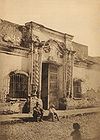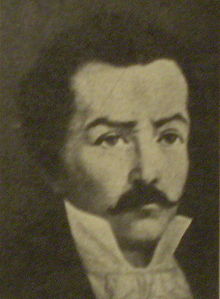- Francisco Narciso de Laprida
-
Francisco Narciso de Laprida (October 28, 1786 in San Juan – September 22, 1829) [1] was an Argentine lawyer and politician. He was a representative for San Juan at the Congress of Tucumán, and its president on July 9, 1816, when the Declaration of Independence of Argentina was declared[2].
Laprida started his studies at the Real Colegio de San Carlos in Buenos Aires, after which he moved to Santiago de Chile to study Law at the Universidad de San Felipe, where he graduated in 1810. He participated in the Cabildo Abierto in Chile, one of the first steps towards the independence of that country. In 1812 he returned to San Juan, where he was named trustee of the Cabildo government house.
As such, Laprida collaborated with José de San Martín in the organization of the Ejército de los Andes. Because of his education in law and as an important local figure, he was sent to the Tucumán Congress in 1815 as provincial deputy, together with Fray Justo Santa María de Oro. As the congress had a rotating presidency, Laprida was selected for the presidency on July 1, and was still its president 8 days later, when the independence of the country was declared.
He returned to San Juan at the end of the deliberations, were he served as acting governor replacing José Ignacio de la Roza. As interim governor he took a determined and tough line against the dissidents. At the end of his internship he represented his province again in 1824 at the General Constituent Congress, being its president for some months.
As a member of the Unitarian Party, the execution of Manuel Dorrego by Juan Lavalle was a hard blow, after which Laprida returned to San Juan. He later had to flee again towards Mendoza Province, to escape Manuel Oribe and Facundo Quiroga's forces. On September 22, 1829, the men of José Félix Aldao, shortly after defeating the unitarian commander Juan Agustín Moyano, reached Laprida's coach and slit his throat; his body was never found.
He is also the great-great-great uncle of Argentine writer Jorge Luis Borges [3]
References
- (Spanish) Argentina Ministry of Education
- (Spanish) La Guía 2000
- Williamson, E, 2005, Borges: A Life, Penguin Books, New York
Congress of Tucumán Representatives Tomás de Anchorena · Juan Agustín Maza · José Antonio Cabrera · Justo de Santa María de Oro · José Ignacio Thames · José Colombres · Gerónimo Salguero · Pedro Ignacio de Castro Barros · José Severo Malabia · Mariano Sánchez de Loria · Pedro Ignacio Rivera · Pedro León Gallo · Pedro Francisco de Uriarte · Esteban Agustín Gazcón · Pedro Miguel Aráoz · Tomás Godoy Cruz · Eduardo Pérez Bulnes · Teodoro Sánchez de Bustamante · José Andrés Pacheco de Melo · José Ignacio de Gorriti · Manuel Antonio Acevedo · Pedro Medrano · Cayetano José Rodríguez · José Darragueira · Antonio Sáenz · Juan José Paso · José Mariano Serrano · Mariano Boedo · Francisco Narciso de Laprida
Rulings Argentine Declaration of Independence - Argentine Constitution of 1819 - Flag of Argentina chosen as National flagSee also Categories:- Members of the Congress of Tucumán
- Argentine lawyers
- 1786 births
- 1829 deaths
- Deaths by blade weapons
- People from San Juan Province
- People of the Argentine War of Independence
- People murdered in Argentina
- Assassinated Argentine politicians
Wikimedia Foundation. 2010.

